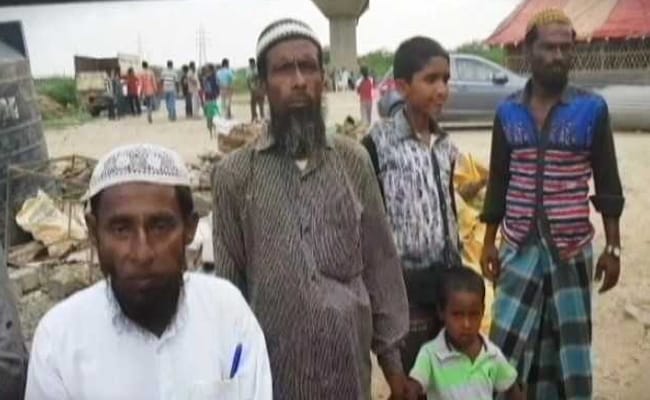Delhi is home to an estimated 1,000 Rohingya Muslims, most of them living in south east Delhi.
New Delhi:
India has declared Rohingya Muslims, the embattled minority fleeing violence in Myanmar, as illegal and ordered their deportation.
But NDTV found Rohingya Muslims in the heart of the national capital with Long-Term Visas issued by the Home Ministry.
Delhi is home to an estimated 1,000 Rohingya Muslims; most of them live in two main settlements - Sharam Vihar and Madanpur Khadar, both in south east Delhi.
In both camps, we found at least 25 Rohingya Muslims had visas.
Mohammad Shira Zullah, a Rohingya in the Sharam Vihar camp detailed the procedure. "We have a Long-Term Visa given by the government. First the United Nations High Commissioner for Refugees (UNHCR) gives us a supporting letter after which we apply to the FRRO (the Home Ministry's Foreigners Registration Office). They give us a date. We take the children and go to the FRRO office where our fingerprint is taken and another date is given. An interview happens and on another date we get the Long-Term Visa (LTV). It takes approximately 6 months," he said.  Mohammad Saleemullah, a 34-year-old Rohingya in the Madanpur Khadar camp told us that the LTV is a one year visa. "Every year it is renewed. In 2014 I got my visa and every year I have renewed it," he said.
Mohammad Saleemullah, a 34-year-old Rohingya in the Madanpur Khadar camp told us that the LTV is a one year visa. "Every year it is renewed. In 2014 I got my visa and every year I have renewed it," he said.
NDTV had reported that while India is not a signatory to the UN refugee laws, existing Ministry of Home Affairs guidelines allow for those fleeing persecution to apply for a LTV. To this, the Ministry had said Rohingyas would not qualify, since they entered India illegally.
Legal experts we spoke to said this is a flawed argument.
Colin Gonsalves, Founder of the Human Rights Law Network and a Senior Advocate in the Supreme Court told NDTV, ''All refugees will come without a visa or passport so they will all be illegal in that technical sense, but international law and Indian law will say once they come in they cannot be sent back where they could face persecution. It (being sent back) is like a death sentence."
Regardless, the discovery that a number of Rohingyas in India have been granted or renewed LTVs, some even under this government, contradicts their depiction by the Centre as illegal.
Home Ministry sources said that the foreigners division of the ministry is now collecting information if any Rohingyas have been given LTVs.
Meanwhile, in Delhi and in Jaipur, another city where Rohingyas have settled, NDTV came across several Rohingyas who were planning to apply for an LTV, with encouragement from local authorities.
"We are motivating them for registration, to take Long Term Visas. After registration information about all their activities will be available online. We can know about their movements," said Ramjeevan Gupta, Additional Superintendent of Police, CID, Jaipur.
But NDTV found Rohingya Muslims in the heart of the national capital with Long-Term Visas issued by the Home Ministry.
Delhi is home to an estimated 1,000 Rohingya Muslims; most of them live in two main settlements - Sharam Vihar and Madanpur Khadar, both in south east Delhi.
In both camps, we found at least 25 Rohingya Muslims had visas.
Mohammad Shira Zullah, a Rohingya in the Sharam Vihar camp detailed the procedure. "We have a Long-Term Visa given by the government. First the United Nations High Commissioner for Refugees (UNHCR) gives us a supporting letter after which we apply to the FRRO (the Home Ministry's Foreigners Registration Office). They give us a date. We take the children and go to the FRRO office where our fingerprint is taken and another date is given. An interview happens and on another date we get the Long-Term Visa (LTV). It takes approximately 6 months," he said.

Estimates suggest close to 90,000 Rohingyas have fled from Myanmar to Bangladesh.
Legal experts we spoke to said this is a flawed argument.
Colin Gonsalves, Founder of the Human Rights Law Network and a Senior Advocate in the Supreme Court told NDTV, ''All refugees will come without a visa or passport so they will all be illegal in that technical sense, but international law and Indian law will say once they come in they cannot be sent back where they could face persecution. It (being sent back) is like a death sentence."
Regardless, the discovery that a number of Rohingyas in India have been granted or renewed LTVs, some even under this government, contradicts their depiction by the Centre as illegal.
Home Ministry sources said that the foreigners division of the ministry is now collecting information if any Rohingyas have been given LTVs.
Meanwhile, in Delhi and in Jaipur, another city where Rohingyas have settled, NDTV came across several Rohingyas who were planning to apply for an LTV, with encouragement from local authorities.
"We are motivating them for registration, to take Long Term Visas. After registration information about all their activities will be available online. We can know about their movements," said Ramjeevan Gupta, Additional Superintendent of Police, CID, Jaipur.
Track Latest News Live on NDTV.com and get news updates from India and around the world

